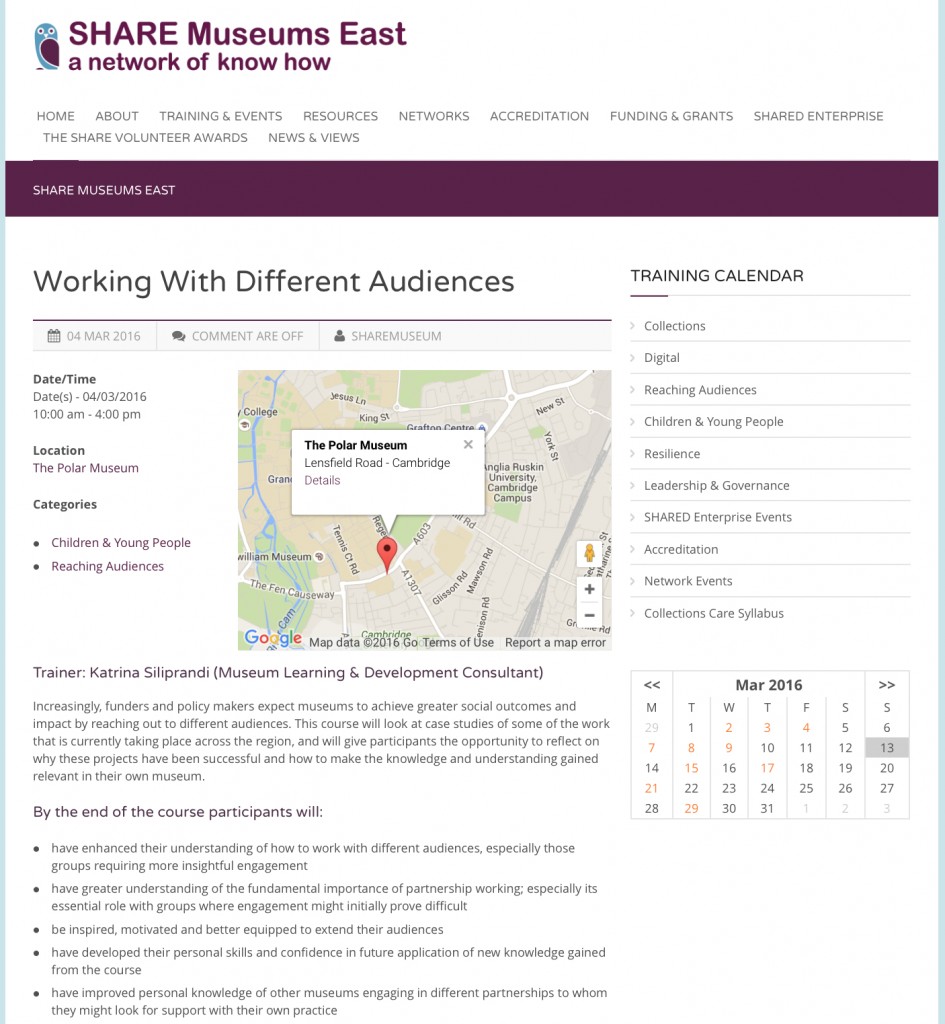Judith with support work Reshma and Kate went to the Polar Museum in Cambridge to present the Sensory Object research project to SHARE East Working with Different Audiences. We co-presented the research, Judith did an excellent job describing her Sensory Label for the Enlightenment Gallery at the British Museum and how we use the five senses in our workshops. The organiser Katrina Siliprandi commented after
“Thank you so much for your input to today’s programme. It was brilliant for the group to hear about the work you have been doing and presented so clearly and interestingly. Thank you so much for arranging for Judith to also contribute to the presentation. I think the work you are doing is wonderfully innovative and exciting and clearly so valuable for the project members.”
We were also given a fascinating tour of the Polar Museum after the seminar.

Judith demos how a bend sensor activates her sound in her Sensory Label made for the Enlightenment Gallery at the British Museum
Working with Different Audiences Programme
9.45 Coffee
10.00 Introduction
10.05 Speaker: Naomi Chapman, Polar Museum “Building up different audiences at the Polar Museum.”
Naomi from the Education and Outreach team will talk through some of the ways that the Polar Museum have worked to increase the diversity of their audiences.
10.35 Speaker: John Lanagan, CEO, Museum of East Anglian Life “A Prescription for Living” – Improving health and well being through inclusion and participation.
The workshop will provide an overview of the programmes the Museum of East Anglian Life has developed for supported volunteering and adult skills development for people with learning and physical disabilities, mental health issues and otherwise disadvantaged backgrounds. In interactive sessions delegates will have the opportunity to explore the motivation for working with diverse groups, what unique opportunities their organisation can offer and some of the practicalities of delivery.
11.30 Speaker: Isabel Craig, The Norris Museum “Spuds, Spam and Stirrup Pumps”
12.00 A brief tour of the Polar Museum with Naomi Chapman, thinking about how the various spaces and display might work with different audiences.
12.30-1.15 Lunch, including tea and coffee
1.15 Speaker: Gill Brailey, Heritage Learning Manager, Lancashire County Council Cultural Services “Creating an Autism Friendly Museum”, a case study in discovering a range of resources and strategies to support museum visits
2.00 Speaker: Judith Appiah, Sensory Objects Co-Researcher from the Tower Project and Dr Kate Allen, Associate Professor in Art, Department of Art, University of Reading “Sensory Objects”
This programme is about the co-creation of multi-sensory interactive art works that respond to museum collections, to generate alternative ideas for museum interpretation, developed through art and electronics-based workshops by people with learning disabilities in collaboration with an interdisciplinary research team.
Over the last three years researchers from the University of Reading and RIX Research and Media at the University of East London have collaborated with people with learning disabilities from the Tower Project London exploring collections in The Enlightenment Gallery at The British Museum where they created Sensory Labels.
They worked with Reading College students from the Learners with Learning Difficulties /Disabilities Dept exploring the University of Reading’s Museum of English Rural Life (MERL) where they created interactive farm animal prototypes which they are currently developing into more robust versions of the original ideas for the re-hang of MERL.
They also worked with Mencap Liverpool Access to Heritage at the National Trust’s Speke Hall where they have made Sensory Story boxes. Sensory Objects was funded by the Arts and Humanities Research Council 2012-15 and are currently applying for further funding to create a more sustainable enterprise for people with Learning Disabilities to work within museums and heritage sites.
2.45 Speaker: Jeremy Kimmel, Audience Development Officer, Tunbridge Wells Museum and Art Gallery “Using Partnerships to Unlock New Audiences”
Jeremy will talk about how partnerships have allowed Tunbridge Wells Museum and Art Gallery to work with different audiences and develop the Dementia Toolkit
3.30-3.45 Plenary



